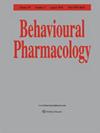NSC689857, an inhibitor of Skp2, produces antidepressant-like effects in mice.
IF 1.6
4区 心理学
Q3 BEHAVIORAL SCIENCES
引用次数: 0
Abstract
We have previously reported that two inhibitors of an E3 ligase S-phase kinase-associated protein 2 (Skp2), SMIP004 and C1, have an antidepressant-like effect in non-stressed and chronically stressed mice. This prompted us to ask whether other Skp2 inhibitors could also have an antidepressant effect. Here, we used NSC689857, another Skp2 inhibitor, to investigate this hypothesis. The results showed that administration of NSC689857 (5 mg/kg) produced an antidepressant-like effect in a time-dependent manner in non-stressed male mice, which started 8 days after drug administration. Dose-dependent analysis showed that administration of 5 and 10 mg/kg, but not 1 mg/kg, of NSC689857 produced antidepressant-like effects in both non-stressed male and female mice. Administration of NSC689857 (5 mg/kg) also induced antidepressant-like effects in non-stressed male mice when administered three times within 24 h (24, 5, and 1 h before testing) but not when administered acutely (1 h before testing). In addition, NSC689857 and fluoxetine coadministration produced additive antidepressant-like effects in non-stressed male mice. These effects of NSC689857 were not associated with the changes in locomotor activity. Administration of NSC689857 (5 mg/kg) also attenuated depression-like behaviors in male mice induced by chronic social defeat stress, suggesting therapeutic potential of NSC689857 in depression. Overall, these results suggest that NSC689857 is capable of exerting antidepressant-like effects in both non-stressed and chronically stressed mice.NSC689857是一种Skp2抑制剂,可在小鼠体内产生类似抗抑郁的效果。
我们以前曾报道过,E3连接酶S期激酶相关蛋白2(Skp2)的两种抑制剂SMIP004和C1对非应激和慢性应激小鼠有类似抗抑郁的作用。这促使我们思考其他 Skp2 抑制剂是否也有抗抑郁作用。在此,我们使用另一种 Skp2 抑制剂 NSC689857 来研究这一假设。结果表明,给非应激雄性小鼠服用 NSC689857(5 毫克/千克)会产生类似抗抑郁的效果,这种效果是时间依赖性的,从给药后 8 天开始。剂量依赖性分析表明,给非应激雄性小鼠和雌性小鼠服用 5 毫克/千克和 10 毫克/千克的 NSC689857 会产生类似抗抑郁的作用,而服用 1 毫克/千克的 NSC689857 不会产生这种作用。如果在 24 小时内三次(测试前 24、5 和 1 小时)给药 NSC689857(5 毫克/千克),也会对非应激雄性小鼠产生抗抑郁样作用,但如果急性给药(测试前 1 小时),则不会产生这种作用。此外,NSC689857和氟西汀联合给药对非应激雄性小鼠产生了相加的抗抑郁样作用。NSC689857 的这些作用与运动活动的变化无关。服用 NSC689857(5 毫克/千克)还能减轻雄性小鼠在慢性社会挫败应激诱导下的抑郁样行为,这表明 NSC689857 具有治疗抑郁症的潜力。总之,这些结果表明,NSC689857能够对非应激和慢性应激小鼠产生类似抗抑郁的作用。
本文章由计算机程序翻译,如有差异,请以英文原文为准。
求助全文
约1分钟内获得全文
求助全文
来源期刊

Behavioural Pharmacology
医学-行为科学
CiteScore
3.40
自引率
0.00%
发文量
84
审稿时长
6-12 weeks
期刊介绍:
Behavioural Pharmacology accepts original full and short research reports in diverse areas ranging from ethopharmacology to the pharmacology of schedule-controlled operant behaviour, provided that their primary focus is behavioural. Suitable topics include drug, chemical and hormonal effects on behaviour, the neurochemical mechanisms under-lying behaviour, and behavioural methods for the study of drug action. Both animal and human studies are welcome; however, studies reporting neurochemical data should have a predominantly behavioural focus, and human studies should not consist exclusively of clinical trials or case reports. Preference is given to studies that demonstrate and develop the potential of behavioural methods, and to papers reporting findings of direct relevance to clinical problems. Papers making a significant theoretical contribution are particularly welcome and, where possible and merited, space is made available for authors to explore fully the theoretical implications of their findings. Reviews of an area of the literature or at an appropriate stage in the development of an author’s own work are welcome. Commentaries in areas of current interest are also considered for publication, as are Reviews and Commentaries in areas outside behavioural pharmacology, but of importance and interest to behavioural pharmacologists. Behavioural Pharmacology publishes frequent Special Issues on current hot topics. The editors welcome correspondence about whether a paper in preparation might be suitable for inclusion in a Special Issue.
 求助内容:
求助内容: 应助结果提醒方式:
应助结果提醒方式:


